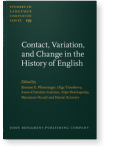Tracing uses of will and would in Late Modern British and Irish English
The present qualitative and quantitative study investigates the use of Late Modern English would on the basis of corpus data from Late Modern Irish English and of data from the Archer Corpus for Late Modern British English. It is the aim of the paper to show to what extent differences observed in the use of would in contemporary Irish and British English are already observable in data from the Late Modern period. For comparison with contemporary varieties, data from ICE Ireland is investigated and compared to previous findings on ICE-GB. It is found that the well-documented differences between the categories in the present day varieties are only partly in evidence in the corpus material from the Late Modern period. While will is found more frequently both overall and in contexts expressing prediction in the Irish English than in the British English data, would does not show any significant differences in the corpus texts. These partial differences are argued to be due to the as yet incomplete variety formation processes of Irish English in the period in question.
